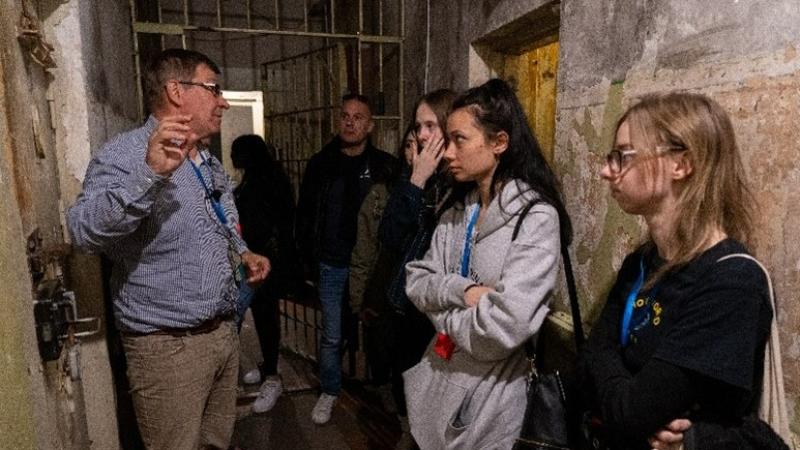A group of third-year Criminology students and three members of staff from the University had an experience of a lifetime while visiting criminal justice institutions in the Baltic region of Northern Europe in a packed schedule spanning two weeks between 15-28 May.

During the comparative criminal justice field trip, the cohort visited Finland, Estonia, Latvia, and Lithuania. The event considered crime control and prisons globally and comparatively, and integrated a range of educational, cultural and historical activities.
The first stop was at Tampere University, where prison based lectures and activities were provided by specialists in the field including Dr Andreas Aresti and PhD student Sinem Bozkurt. Following this, the Westminster students - who were also accompanied by students and staff from four other universities including Tampere University in Finland, Sheffield Hallam University in the UK, and Marquette University and Finlandia University in the US - got the opportunity to spend a day in an open prison in Huitten, Finland, which even had a sauna.
The group then went to Lithuania, and visited Vilnius University, where they were given a lecture on the criminal justice system in this state. They also visited the recently decommissioned and notorious Lukiškės prison in Vilnius. This was a very insightful experience and as Criminology BA student Leah Rogers articulated: “It survived both World Wars, the Soviet occupation, and held people from many different ethnic, cultural and political backgrounds…it was a very informative and culturally relevant place to visit, and it gave a lot of insight into how badly prisoners were treated and the very poor conditions they were kept in.”
In Latvia, the participants were shown around the KGB museum in Riga, formerly known as ‘The Corner house’, which was the home of the KGB during the Cold War. The guide demonstrated how the KGB operated and maintained a regime of terror, showing the cohort rooms dedicated to interrogation, detention and execution. They also visited the former KGB style prison Karosta and experienced what it was like to be a prisoner in the dark walls of this former soviet prison. The experience lasted most of the day, and they got a taste of the regime, including being locked up in dark cells, doing physical activity, and getting a muted idea of the punishments those incarcerated here experienced. The day ended with the group eating the typical food served to the prisoners.
From here, they visited Tallin in Estonia and took the opportunity to visit the Academy of Security Sciences and have a guided tour of the establishment, including seeing the mock prison used for prison officer training. The students also had an insightful lecture on criminal justice and the ongoing security issue in the Baltics. Following this they got to visit a maximum-security prison Viru Vangla in Johvi, Estonia. The prison director, a former special forces soldier, also gave them a lecture on the prison and its regime, prior to them going on a tour of the prison.
After an intense 11 days, the group arrived back in Finland, and had a few days in Helsinki, enjoying both the cultural side and the nightlife.
However, during the fieldtrip, the students also got to learn about the other cities they visited. As Criminology BA student Mina Minatel put it: “Throughout our stay, we found a welcoming environment, and had the opportunity to learn more about the history and culture of the beautiful cities we visited, in particular through guided tours in Tallinn, Riga and Tampere. Our guide in Tallinn was exceptional and managed to make our tour not only informative but entertaining, ensuring to show us the best views of the city and leaving us with several interesting facts about its history and crime and justice in the mediaeval times.”
All the participants enjoyed the eye-opening comparative criminal justice field trip and left rave reviews about the adventure. Mina continued: “The two weeks we spent on the comparative criminal justice trip were one of the highlights of my degree: it was an unexpected and unique experience that I feel very grateful for. On top of its academic and educational aspects, this trip allowed us not only to connect with different students abroad, but also gave us the opportunity to build new friendships within our own university’s group, which has been challenging during the COVID pandemic, and represented a nice moment of closure for our degree."
Another Criminology student Alejandra Rivera Torres praised the cultural aspects of the international experience: “From a cultural perspective, I had never visited any of the countries we would be going to and was excited to see a new part of the world and experience new cultures. Furthermore, the fact that this trip included universities and people from all over the world gave us the opportunity to broaden our cultural horizons.”
Lili Angelova Buchova, also a Criminology BA student, said: “The trip was a great experience, which gave me a lot to think about. I also learned a lot about the Criminal Justice System, prison population and I gained a lot of critical evaluation skills. The trip itself helped me also to reconsider my future decision about where and what I want to work.”
Find out more about the Criminology BA Honours course.







